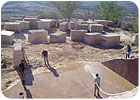
Based in Vitória, Espírito Santo, Brazil, Adalia Imp. & Exp. De Granitos Ltda. operates five quarries in Brazil; three in the State of Bahia and two in the State of Minas Gerais. The company’s site for Tuscan Sunset granite produces 100 to 150 cubic meters per month.
Capitalizing on the popularity of Brazilian stone, Adalia Imp. & Exp. De Granitos Ltda. of Vitória, Espírito Santo, Brazil, was established in 2005 as a supplier of Brazilian stone materials to an international client base, and it has recently increased its product line with a collection of quartzite.
Adalia was formed through the union of three long-time colleagues, each with an extensive background in the natural stone industry and each contributing unique skill sets and talents that complement the organization. Founders include Tobias Junge, a mining engineer with over 12 years of experience in quarrying, prospecting, mine valuation and mine planning. A citizen of Germany, Junge studied mining at the world-renowned Technical University of Berlin. He manages all of Adalia’s mining and prospecting activities, and he is responsible for the company’s block and slab sales to European markets. The team also includes Bebeto Pedral, a Civil Engineer with over 10 years of experience in the natural stone business with a focus on material selection, quality control and sales. Pedral is originally from Rio de Janeiro and studied at the Federal University of Espírito Santo in Vitória. He is involved in the full spectrum of the production cycle, from the selection of the raw materials to the processing of materials and final quality assurance. He is also responsible for block sales to Asian markets.
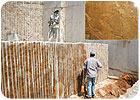
Workers use drills to expose a new bench at the Copper Canyon quarry.
Adalia began its operation in July of 2005 with a focus on prospecting and extracting the rich mineral reserves that Brazil has to offer. “Through the formation of various partnerships and strategic alliances, Adalia has been able to assemble a unique palette of materials oriented toward the American, European and Asian markets,” Armantrout said.
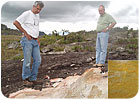
Examing and analyzing a test blast is an important phase in the prospecting for new materials, such as here at a site for Giallo Macaúbas.
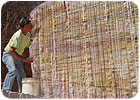
The quarry site for Calypso quartzite is located in the same geological deposit of quartzite which cuts through the States of Minas Gerais and Bahia in Brazil. The famous Azul Macaúbas is found in the same chain.
Marketing/principal markets
Adalia’s main sales activity is focused on the export of processed slabs to the U.S. market. This activity makes up approximately 65% of the company’s annual sales revenues. Only about 2% of slab sales are to the European market, although this is expected to increase in 2007, with its line of quartzite products, which are particularly sought after in Germany.Other activities by Adalia include the sale of rough blocks, mainly from its own quarries, for export to European and Asian markets. This makes up the remaining 33% of the company’s sales activities. The block-trading business is expected to increase significantly in 2007, particularly to Asian markets.
Among its exports, Adalia sells to natural stone distributors within the North American market. “We try to identify a potential partner in each market segment and to develop a commercial relationship with that targeted client,” Armantrout said. “Our clients tend to appreciate this approach because we only promote materials where we can offer continuous supply to our clients and where we can offer a strong competitive advantage.”
According to Armantrout, the ability to guarantee long-term supply begins at the quarry level, by “critically analyzing the quarrying operations of any material that we promote or, ideally, by promoting materials where we own and operate the quarries or where we enter into strong partnerships.”
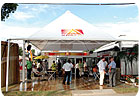
Adalia has become a regular exhibitor at the Vitória Stone Fair, where it showcases its products to an international audience of clients.
Stone production
Adalia principally manufactures slabs, although its Quartzite Collection will present an opportunity to begin processing rough-cut or natural-cleft tiles for exterior applications such as for swimming pool areas as well as honed and polished tiles for interior use. “This is a part of the business which will certainly expand, as it allows us to maximize quarry production yields by facilitating the processing of blocks which would normally not be suitable for countertop production due to block size,” Armantrout said.Adalia employs 29 people, of whom six are in administrative positions and the remainder are involved in quarrying and production operations. “Fortunately, the explosion in natural stone production in the State of Espírito Santo has resulted in the development of a highly skilled work force,” Armantrout said. “Brazilian workers are becoming highly knowledgeable and skilled in the processes of extracting and processing granites, marbles and quartzite materials. So the labor pool makes it relatively easy to find good people, although continuous training is always crucial to the success of any operation.”
Adalia is currently developing a strategically located area of nearly 540,000 square feet (50,000 sq.m) for the installation of a processing plant. This plant will initially include a polishing line, and an area designated for the resining of slabs. “We hope to break ground by June of 2007 and complete the construction and installations by the end of 2007,” Armantrout explained. “In Espírito Santo, because of the high level of cutting capacity available for contracting, it is not necessary to install gangsaws at this point. Instead, we are highly considering the purchase of a multi-wire saw from Bideseimpianti or Pellegrini, which offers high cutting capacity with significant cost savings and environmental benefits. Currently, we process, inspect and export an average of 30 containers per month, which is expected to increase to 60 in 2007.”
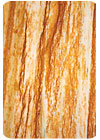
Adalia reports that its quartzite materials are highly resistant, scratch-proof materials that are well-suited for kitchen countertops and flooring applications.
Quarry operations
Adalia currently operates five quarries; three in the State of Bahia and two in the State of Minas Gerais. Materials produced are Calypso quartzite, Tuscan Sunset granite, Verde Antigua granite, Giallo Macaúbas quartzite and White Silk quartzite.“Calypso, Giallo Macaúbas and White Silk quartzite are produced from the same geological deposit of quartzite which cuts through the States of Minas Gerais and Bahia in Brazil,” Armantrout said. “The famous Azul Macaúbas is found in the same chain, and geological evidence shows that there is a potential for several other interesting products to be explored from this same body.” Verde Antigua is a Charnockite, which is a classification of granite that is normally reserved for granites with a concentration of darker minerals, often giving the granite a dark green color. Charnockites often become yellow with time, as in the case of Verde Ubatuba. However, this is not the case with Verde Antigua, which makes it highly suitable for monuments and other outdoor applications.
“Tuscan Sunset is a Migmatite, which is a granite of plutonic origin; meaning that it was formed in the earths crust and cooled over a long period of time,” Armantrout continued. “This cooling and mixing of the minerals is what gives Tuscan Sunset its unique movement and texture.”
The extraction techniques are a response to the natural environment of the quarries. “We tend to focus on the extraction of material from solid formations, which allows you to prove the existing reserves of material and to plan your quarrying activity and mine development properly,” Armantrout said. “Diamond wire cutting is used extensively to perform both vertical and horizontal cutting with Komec machines from Cachoeiro de Itapemirim. This type of primary cutting gives the highest quarry yields, as you waste less material in the cut. We have tested many types of diamond wire and currently use wire from Boart Longyear, which has given the best results to date.
“All splitting is done with expanding cement from Fract-AG,” Armantrout continued. “Expansive cement eliminates ‘blast cracks’ in the material and again, results in higher quarry yields and less defects in the blocks and resulting slabs. Explosives are used minimally and when necessary, black powder is used, which is a less powerful explosive. Front-wheel loaders are used both for the movement of blocks in the quarry and also for tipping the quarry benches after primary wire cutting and drilling is finished. The benches are pulled with a pulley system, which allows us to tip benches over for the final squaring of the blocks.”
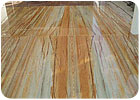
Bookmatched slabs are among the products offered by company.
- Calypso quarzite - produces 30 to 50 cubic meters per month (equal to three to five containers in 3-cm thickness). Nearly 100% is eventually exported to the U.S. market in slab form. Adalia has entered into a marketing agreement with the company Cajugram of Cachoeiro de Itapemirim for this particular material. Adalia and Cajugram cooperate together for the promotion and distribution of this material in export and domestic markets.
- Tuscan Sunset granite - produces 100 to 150 cubic meters per month (equal to 10 to 15 containers in 3-cm thickness). Approximately 70% of this is exported to the U.S. market, and the remaining 30% is split between European and Asian countries.
- Verde Antigua granite - produces 50 to 100 cubic meters per month (equal to five to 10 containers in 3-cm thickness). This material is very popular in European markets such as Germany, Poland and France for the processing of funerary monuments.
- Giallo Macaúbas quartzite - produces 40 to 60 cubic meters per month (equal to four to six containers in 3-cm thickness). Approximately 60% is shipped to the U.S. market in slab form, and the balance is exported to European markets for interior applications.
- White Silk quartzite - produces 40 to 50 cubic meters per month (equal to four to five containers in 3-cm thickness). Approximately 50% is exported to the U.S. market, and the remaining 50% is sold to European markets, particularly Germany. This material is also highly sought-after in some of the wealthier South American cities like São Paulo, where it is used for interior applications. Both Giallo Macaúbas and White Silk are produced and marketed through a joint venture with Bellagio Stone, also of Vitória.
Each quarry operates with a team of individuals consisting of a quarry manager, two machine operators, a diamond wire specialist and several drill rig operators. A normal team consists of 10 to 12 people.